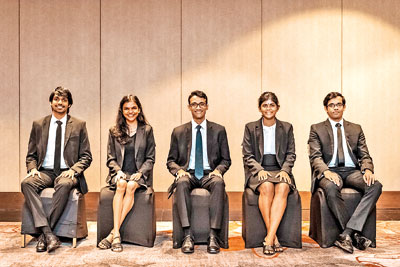Colombo Uni law students champs of Moot Court Comp
Bringing home an unprecedented victory for the country, the Moot Court Bench (MCB) team representing the Faculty of Law of the University of Colombo (UoC) has emerged Champions at the Global Rounds of the 19th John H. Jackson Moot Court Competition 2021.
The team, comprising Saheli Wikramanayake, Avishka Jayaweera, Adithya Ramanitharan and Sandun Batagoda, was trained by Senior Partner at the MCB Harish Balakrishnan and Harrison Mbori after being selected for the MCB’s International Trade Law Program in July 2020.

The champions: (From L to R) Avishka Jayaweera, Saheli Wikramanayake, Harish Balakrishnan (Senior Partner at the MCB), Adithya Ramanitharan, Sandun Batagoda
In the Final Round, the UoC team became the first Sri Lankan team to break through to the Global Rounds and win amongst hundreds of the best international universities that participated in the John H. Jackson Moot Court Competition, held virtually this year. JHJ is the premier International Moot Court Competition organized annually by the European Law Students’ Association (ELSA) focused on International Trade Law (ITL) and based on the rules of the World Trade Organization (WTO).
The team, all third year students at the UoC Faculty of Law, brought a variety of experience to the table. Avishka is a proud Royal College alum, where he rowed and has continued to as part of the UoC’s rowing team. Saheli was a debater at Ladies’ College, and began mooting at the Phillip C. Jessup Moot Court Competition in her first year. Similarly, Sandun was part of the Ananda College debate team, that won the Sri Lanka Schools Debating Championship in 2016. Adithya was Head Girl of Vembadi Girls’ High School, Jaffna and also represented the Faculty at the SAARC Moot Competition, MCB National Mediation Competition and Warsaw Negotiation Competition.
It can be no surprise then that this team of highly driven individuals strived for no less than absolute perfection from their very first day, aided greatly by their coach. As Adithya recalls, the first day they met their coach, Harrison Mbori, he asked, “‘Are you guys here to win this competition?’ After a moment of silence, he said ‘if not, I can’t be your coach’.
“That’s how it all started. We all set our mind that we aren’t here to just participate but to actually win.”
The training was rigorous but the team was up for the challenge, and ultimately their twelve drafts memo and weeks spent poring over every punctuation mark paid off, as the memo marks were 40% of the score in the prelims. Though they didn’t win the Regional Rounds, they still broke into the Global Finals.
“We knew we had an uphill battle to get to the standard of the other teams that broke. We were incredibly lucky to have so many people who were eager to help us out and come take practices with us. With each practice we felt our confidence and comfort improve,” says Sandun, who was elected captain of the team.
In terms of strategy and argument, Avishka reveals that their approach was to find out every possible argument and counter argument while making sure they were equally capable of making each other’s arguments which proved to be valuable in later stages of the competition. Saheli adds that they also aimed to be memorable in their oral submissions, as a huge part of oral advocacy is forming a connection with the Panel.
This evidently paid off, as the team was also specially recognized for their written and oratory skills with several awards, including the Overall Best Written Submission on Behalf of the Respondent, the award for Best Orator in the Preliminary Rounds.
Saheli Wikramanayake was adjudged the Best Orator in the Grand Final.
“I’m just happy to have been able to contribute to the win for the team,” says Saheli. “Our coach Harrison told us that oral advocacy is more like theatre than we think, so I wanted to show the judges that our team’s submission was a show worth paying attention to.”
Their wins for Best Written Submission Award on behalf of the Respondent at both the West and South Asia Rounds and the Global Final Rounds were a particular proud moment, as it proved that the many hours they spent on research, drafting and proofreading were worth it.
“It all became possible because of our coach, Harish Balakrishnan who would comment on our drafts and say, ‘Why is this comma not italicized?’” says Adithya.
Though they placed high expectations on themselves from the get-go, there was never a lack of commitment or lapse in focus. Neither did they take for granted the amount of support they got or the dedication of their coaches, and as Saheli puts it, the onus was on them to live up to that.
With the tough competition and the wake up call at Regional Rounds as to what level they needed to be at, Saheli shares that the imposter syndrome was hard to avoid at some points while competing against so many big name universities. In spite of the many challenges, the team hopes their win “shows other Sri Lankan students that it is possible and that it’s worth the hard work and effort, because it really has been such an incredible experience.”
The team is grateful for the wide support they received as it was crucial to their journey. From the encouragement of family and friends during the highs and lows and the solidarity of their entire batch who wrote a letter asking for dates to be changed when Regional Rounds clashed with exam dates – to the wisdom and guidance from their coaches, the Faculty Board, the MCB, as well as members of the Commercial Law Development Program (CLDP) of the United States Department of Commerce.
As Sandun puts it, “Our victory proved that with the right people and the right work a team from the Global South can do unimaginable things. The sky is the limit.”


